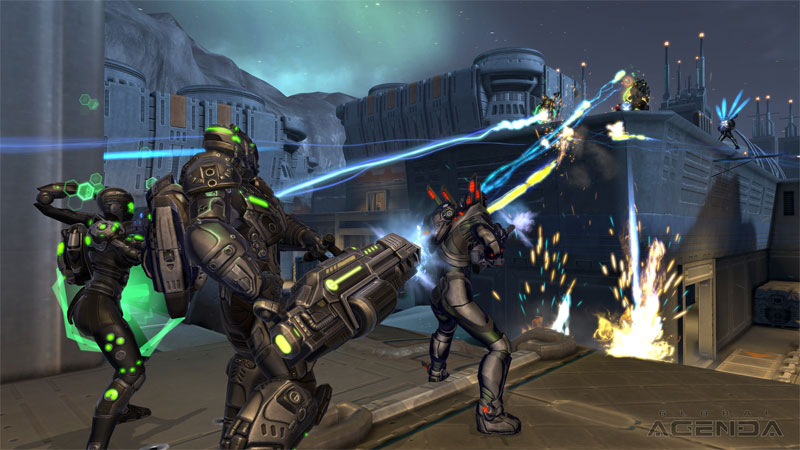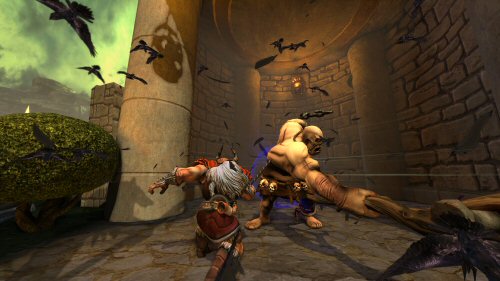Online options are revolutionizing the way that people consume games, from new distribution methods to economic models. It’s given rise to new disruptive game companies and allowed the relatively new game creator Hi-Rez Studios to snatch up the Tribes IP. We talked with Todd Harris, Hi-Rez Studios Chief Operating Officer about the exciting new developments at the
Why did you ultimately decide to switch over Global Agenda to free-to-play?
Three major reasons. The first was exposure and community growth: We felt that by going free-to-play we would significantly increase the number of people creating accounts and trying the game since it costs them nothing to do so; and then strong Global Agenda gameplay would keep them playing.
The second was player-choice: We like the idea that players get to decide how much they spend within a game. We don’t have to convince them to drop $50 up-front as with a retail game. If they like the game they can opt to spend money later on in-game items and services, and do so in a way that is not pay-to-win. And the final reason was around long-term support and updates: we felt that a free-to-play, not pay-to-win model, could still deliver revenue to our studio. And that revenue would allow us to not only maintain Global Agenda but enhance it with significant new updates.
All of the above turned out to be true. In fact, this month we are delivering Global Agenda‘s largest content update to date – the version 1.5 Recursive Colony expansion, and it will be free to the entire community.

Do you feel that free-to-play is now the way to go for most online game developers these days?
Yes. Not necessarily for developers of single-player content. But at Hi-Rez our focus is indeed online games where you play with and against other people. Successful games of this type spread primarily thru strong word-of-mouth and the free-to-play model supports this growth. It is the same reason that other online platforms tend to be free, be it Facebook, Twitter, Skype, etc.
What are some of the biggest changes that the online game market has undergone in the past few years, in your mind?
Digital distribution is the huge change that is disrupting the games industry for the better. As with music, movies, and books, the consumer no longer has to enter a retail store to purchase product. But with games the digital distribution channel is even more powerful because the product no longer has to be static and unchanging. Regardless of how the game is acquired, it doesn’t actually have to be treated like a product at all but more like a an entertainment service where there are constant updates, distributed digitally, based upon what players want. And I think when you have this direct and ongoing communication between developer and user, the result is better games.
Talk to me about some of the advantages and challenges of being an independent and privately funded game studio these days.
Challenges . . . Well, as a single game studio we had to fight for media attention against a lot of big publishers. But now, with three strong online games in development – Global Agenda, Tribes: Ascend, and SMITE, we are definitely seeing that change.
The advantages are numerous. Basically we get to develop the type of games we want to see as gamers, design them the way we want, and release them when we feel they are ready.
I loved some of the ads from Global Agenda poking fun at generic online MMO fantasy environments. Where did the idea for those come from?
With Global Agenda we made a VERY different type of MMO – aiming reticules instead of tab-targeting, player-skill over extreme stat-based level grind, playable in 15-minute mission doses rather than requiring all-night raid coordination, and of course a sci-fi setting rather than generic fantasy with elves. We wanted to communicate how our game was not the typical MMO and that messaging came together with those ads and the tag-line – “No Elves!”
How big is it for the company to have acquired an IP with such a significant online legacy like Tribes?
It is a huge opportunity for us. Again, it is not like a publisher acquired the IP and contracted with Hi-Rez Studios to do the development. As a studio we sought out the IP and acquired it because we missed Tribes and were excited to renew that franchise.
What are some of the ways you’re looking to promote Tribes: Ascend and get long-time fans of the series excited?
We have a lot of promotion planned but I think long-term fans are most motivated by seeing gameplay, and of course eventually getting hands-on in Beta.
With Tribes, so much of the game revolves around the feel of movement and physics involved with jetpacking, skiing, momentum, and weapon impact. There is a speed and fluidity and elegance in Tribes that you simply don’t find in any other shooter. The dev team has worked hard to nail that feel and we see fans get most excited once they are hands-on.
 SMITE in action.
SMITE in action.
Talk to me about your SMITE project and how you’re looking to make that stand out from your other offerings.
SMITE will be our first game without jetpacks!
As with Global Agenda and Tribes: Ascend, SMITE is a multiplayer online game with a big emphasis on teamwork, tactics, and strategy. But beyond that it couldn’t be more different.
Gamers familiar with DoTA or League of Legends will see familiar elements like 5 versus 5, session-based games, minions, towers, and in-match leveling and item-buying. But the huge change is the 3rd-person camera. That doesn’t just improve how the game looks, it changes completely how the game is played. Plus we are excited by the theme of mythology. Our art team has created some very compelling playable gods including Zeus, Anubis, Odin, Kali, and many others. Again, gameplay videos sell SMITE better than any words do so I encourage folks to check the coverage from PAX where we had a great showing of SMITE.
Todd, thanks for your time.
_ _
Played Global Agenda Looking forward to the new games from Hi-Rez Join the discussion on Facebook.

